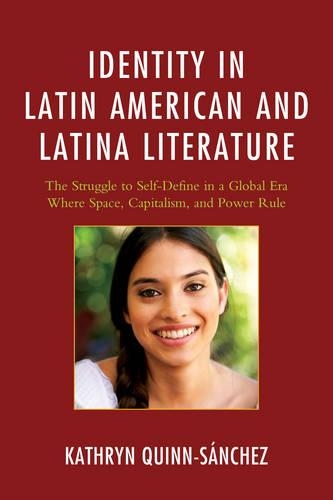
Identity in Latin American and Latina Literature: The Struggle to Self-Define In a Global Era Where Space, Capitalism, and Power Rule
(Paperback)
Available Formats
Publishing Details
Identity in Latin American and Latina Literature: The Struggle to Self-Define In a Global Era Where Space, Capitalism, and Power Rule
By (Author) Kathryn Quinn-Snchez
Bloomsbury Publishing PLC
Lexington Books
23rd May 2016
United States
Classifications
Professional and Scholarly
Non Fiction
Ethnic studies / Ethnicity
860.9
Physical Properties
Paperback
144
Width 151mm, Height 227mm, Spine 11mm
227g
Description
This study demonstrates the ways that Latina authors contest how power and space exploit women while simultaneously subverting the Nation-State through reimagining a counter-space where new definitions of the self lie beyond Powers reach. Moreover, this book delves into how both Power and Space collude to uphold the out-of-date sexist, racist, and classist societal norms that Eurocentrism and history continue to cleave to as the defining qualities of the nation and its citizens. With the proliferation of Latin literature within the United States, an ideological readjustment is taking place whereby several late twentieth- and early twenty-first-century authors contest the States role in defining its citizens by exposing the unjust role that Space and Power play. With this in mind, the author examines several literary versions of identity to explore how certain authors reject and subvert the social mores against which present-day citizens are measuredespecially within government or State institutions but also within families and neighborhoods. The literary works that are analyzed cover a period of twenty-five years ending in 2010. Several of these texts rewrite the national allegory from the point of view of the marginalized while others demonstrate how an individual successfully renegotiates her identitygender, social class, or ethnicityfrom being a disadvantage to being an identity marker to celebrate. The authors defy the place that women are still relegated to, by representing several characters who consciously decide that it is time to battle the forces that would keep them powerless in the public arena. Above all, these texts are anti-Power; the protagonists refuse to accept the societal forces which constantly barrage them, defining them as worthless. These authors and their characters challenge everything that historically has kept women relegated to a space of weakness.
Reviews
This slim volume deals with womens exploration of identity in the face of hegemonic structures that seek to limit the way in which gender roles, nationality, and ethnicity are defined. Avoiding impenetrable theoretical discussions, Quinn-Snchez devotes each of the volume's three sections to different contemporary booksmost of them novels, though she also includes testimonioand how their authors reject, contest, and subvert powerful constructs of 'space.' In doing so, she follows the theoretical work of Henri Lefebvre . . . who 'explains how space primarily functions to oppress those considered as inferior by society in an attempt to control the possibility of actual verifiable social change.' The spaces examined include, among others, the Garden of Eden (in Gioconda Belli's El infinito en la palma de la mano), the barrio (Sandra Cisneros's The House on Mango Street), and the borderlands (Ana Maria Castilllo's The Guardians), along with imagined and futuristic spaces that allow new forms of freedom and solidarity for women and their communities. Quinn-Snchez challenges artificial boundaries by including both Latina and Latin American women, and she emphasizes her desire not just to work in the literary sphere but to connect texts to real-world identity issues and human rights. Summing Up: Recommended. Lower-division undergraduates through faculty; general readers. * CHOICE *
Kathryn Quinn-Snchezs book, Identity in Latin American and Latina Literature: The Struggle to Self-Define In a Global Era Where Space, Capitalism, and Power Rule, is a critical addition to scholarship on Latin American and Latino Literature because it seeks to find a commonality of discussion across borders and races rather than limiting her analysis to a single author, region or country. It is always a pleasure to read Dr. Quinn-Snchez work because of her ability to make connections between seemingly disparate topics, and to analyze texts and themes critically in a clear, interesting way. -- Michele Shaul, Queens University of Charlotte
Quinn-Snchezs timely study continues the conversation started by Anzaldas seminal work on the culture of borderlands and interrogates the systems of power inherent in language and space. More importantly, she urges us to read and re-read Chicana subjectivities as decisive actions of individual agency to reject, contest, and subvert imposed definitions of self, nations-states, and other spaces. -- Pamela J. Rader, Georgian Court University
Author Bio
Kathryn Quinn-Snchez is professor at Georgian Court University.
